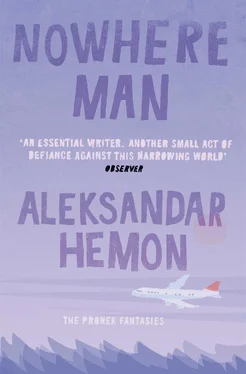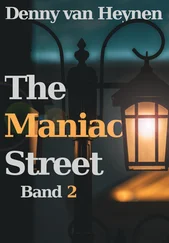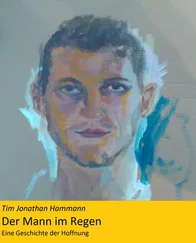Owen stared at him for a long instant, as if deciding what to do with him, then asked: “Where you from?”
“Bosnia.”
“Never heard of it.”
“It was in Yugoslavia.”
“Ah!” Owen said, relieved. “It’s a good place not to be there right now.”
“No,” Pronek said.
“You a war veteran?”
“No. I came here just before the war.”
“You have a blue card?”
“What?”
“You have any security experience?”
“No.”
“See, son, we don’t have detectives around here no more. Detectives are long gone. We used to be private investigators, but that’s over too. We’re operatives now. See what I mean?”
“Yeah,” Pronek said. There was a black-and-gray pigeon on the windowsill, huddled in the corner, as if freezing.
“No Bogey around here, son. I been in this business for a good long time. Started in the sixties, worked in the seventies. Still work. Know what I mean?”
“Yeah.”
“I worked when Papa Daley was running the Machine. .”
The phone rang behind the parapet of papers, startling Pronek. Owen snatched the receiver out of its bed and said: “Yup.” He turned away from Pronek toward the window, but looked over the shivering pigeon, out to the lake. It was a sunny day, cold and blustery still. The wind gasped abruptly, then pushed the windowpane with a thump, overriding the grumbling hum of Michigan Avenue. Above Owen’s hump there was a picture of an army of bulls chasing a throng of men with red scarves down a narrow street. Some of the men were being trampled by bulls who didn’t seem to notice them.
“You can kiss that sonovabitch good-bye,” Owen said, throwing his feet up on the corner of his desk and rocking in his chair. “You’re kidding me. Shampoo? You gotta be kidding me.”
On the desk, there was a pile of letters ripped open, apparently with little patience, and a couple of thick black files. Owen scratched the hair island, the size of a quarter, with his pinkie, beginning to rock faster. The pigeon barely had its eyes open, but then it turned its head back and looked straight at Pronek, smirking. Pronek crossed his legs and tightened his butt muscles, repressing a flatulence.
“I know what you up against. It sure is tough. Join the rest of the fucking world.” He listened for a moment. “Skip the wisecracks, darling, all right?”
The pigeon was bloated, as if there were a little balloon under the feathers. What if the pigeon was a surveillance device, Pronek thought, a dummy pigeon with a tiny camera in its head, pretending to be sick, watching them.
“All right, I’ll see you after the fight tonight. Love ya too,” Owen said, and hung up. He swung back on his chair toward Pronek, sighed and said: “My wife is a boxing judge. Can you believe that? A boxing judge. She sits by the rink, watching two guys pummel each other, counting punches. Hell, people think I’m making that up when I tell them.”
“It’s normal,” Pronek said, not knowing what to say.
Owen opened a drawer in his desk, the drawer resisting with a bloodcurdling screech, and produced a bottle of Wild Turkey. He poured a generous gulp in a cup that had CHICAGO BULLS written around it, shaking his head as if already regretting his decision. He slurped from the cup and his face cramped, as if he had swallowed urine, then it settled down, a little redder now. He looked at Pronek, trying to see through him.
“So you wanna be an operative?”
“I would like to be,” Pronek said.
“We don’t solve big cases here. Rich women don’t make passes at us. We don’t tell off big bosses, and we don’t wake up in a ditch with a cracked head. We just earn our daily bread doing divorces, checking backgrounds, chasing down deadbeat dads, know what I mean? It’s all work, no adventure, pays the rent. Got it?”
“Yeah,” Pronek said.
“Do you know where the Board of Education is?”
“In the downtown,” Pronek said.
“Do you know where Pullman is?”
“No.”
“Way south. Do you know where the Six Corners is?”
“No.”
“Irving Park and. . Oh, fuck it! Do you have a car?”
“No. But I want to buy the car.” Pronek started fidgeting in his chair. A drop of sweat rolled down from his left armpit.
“Do you have a camera?”
“No.”
“Do you know how to tail.”
“Tale?” Pronek asked, perplexed. “You mean, tell the tale?”
Owen formed a pyramid with his hands and put its tip under his nose, then pushed his nose up a little, so the bridge of his nose wrinkled. He glared at Pronek, as if affronted by his sheer presence, curling his lips inward, until his mouth was just a straight line. Pronek wanted to tell him that he could learn, that he was really smart, that he used to be a journalist, talked to people — he could make himself over to be an operative. But it was too late: Owen was blinking in slow motion, gathering strength to finish the interview off. He dismantled the pyramid, unfurled his lips and said:
“Listen, son, I like you. I admire people like you, that’s what this country is all about: the wretched refuse coming and becoming American. My mother’s family was like that, all the way from Poland. But I ain’t gonna give you a job just ‘cause I like you. Gotta pay my rent too, know what I mean? Tell you what I’ll do: give me your phone and I’ll call you if something comes up, okay?”
“Okay,” Pronek said.
Owen was watching him, probably expecting him to get up, shake hands and leave, but Pronek’s body was suddenly heavy and he could not get up from the sofa. Nothing in the room moved or produced a sound. They could hear the ill cooing of the pigeon.
“Okay,” Owen repeated, as if to break the spell.
Pronek stood at the corner of Granville and Broadway, watching his breath clouding and dissolving before his eyes, waiting for Owen. The picture-frame shop across the street had nicely framed Halloween paintings in the window — ghosts hovering over disheveled children, ghouls rising out of graves. The shop window was brightening as the sun was moving slowly out of the lake, most of it still underwater. A man with a rotund goiter growing sideways on his neck was entering the diner on Granville. Pronek thought that the man was growing another, smaller head and imagined a relief of a little, wicked face under the taut goiter skin. Across Broadway, they were tearing down a Shoney’s: what used to be its parking lot was just a mud field now. The building was windowless; floors ripped out; cables hanging from the ceiling like nerves. Just in front of Pronek, a throbbing car stopped at the street light, inhabited by a teenager who had a shield of gold chains on his chest. He was drumming on the wheel with his index fingers, then looked up, pointed one of his fingers at Pronek, and pretended to shoot him. Pronek smiled, as if getting the joke, but then the teenager turned east and disappeared down Granville. Pronek was cold, Owen was late. A Chicago Tribune headline, behind the filthy glass of a newspaper box, read THOUSANDS KILLED IN SREBRENICA. In the distance, Pronek saw a boxy Broadway bus stopping every once in a while on the empty street, sunlight shimmering on its windshield.
Owen pulled up, materializing out of nowhere, brakes screeching, right in front of Pronek. He drove an old Cadillac that looked like a hideous offspring of a tank and a wheel cart. Before Pronek could move toward the car, Owen honked impatiently, and the sound violated the early morning hum. Pronek opened the door, and an eddy of cigarette smoke and coffee smell escaped into the street. Owen said nothing, put the car in gear and drove off — a bus whizzed by, barely missing them. He drove with both of his hands on top of the wheel, alternately looking at the street and frowning at the tip of his cigarette as it was being transformed into its own ashen ghost. Finally, the ash broke off and fell into his lap. Owen said, as if on cue: “Damn, it’s early. But what can we do? We gotta get this guy while he’s home sleeping.”
Читать дальше












